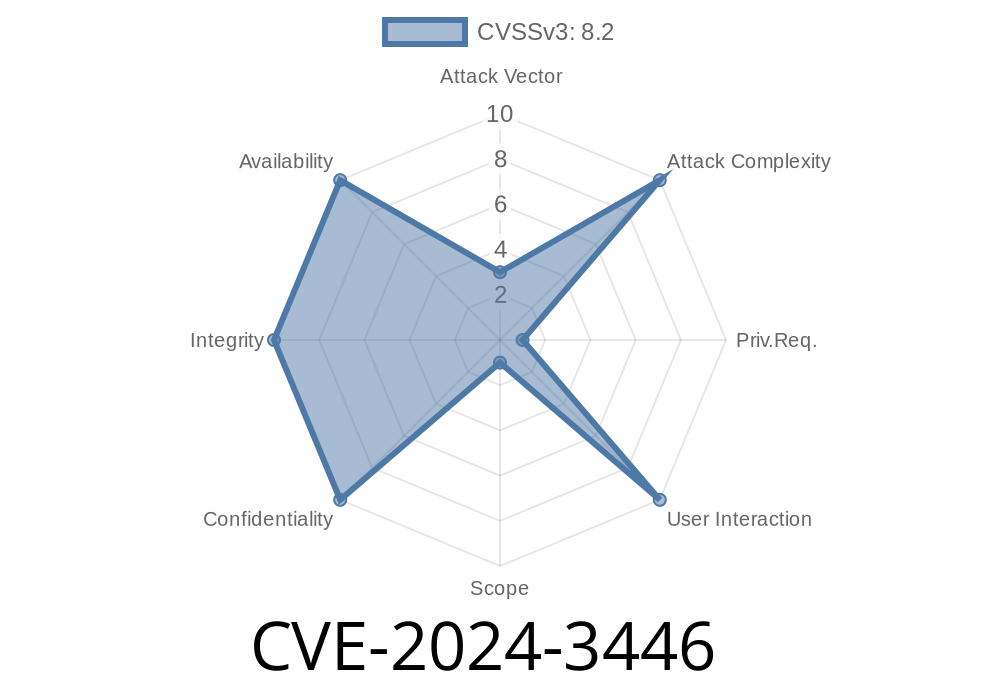CVE-2024-3446 is a critical vulnerability that was discovered in some of QEMU's virtio devices, including virtio-gpu, virtio-serial-bus, and virtio-crypto. This flaw arises due to an insufficient protection by the mem_reentrancy_guard flag, leading to double free scenarios when handling DMA operations. If exploited, this bug can allow a privileged guest user to crash the QEMU process (denial of service) or even execute code on the host via the QEMU process. In this article, we'll break down what happened, how it can be exploited, and offer code snippets that illustrate the vulnerability.
What Is QEMU and Virtio?
QEMU is one of the most popular open-source hypervisors, used for running virtual machines. It uses virtio devices (such as virtio-gpu, virtio-serial-bus, and virtio-crypto) to efficiently connect guest virtual machines to host hardware.
Understanding the Vulnerability
A double free vulnerability happens when a chunk of memory is released (freed) more than once. This mistake can corrupt memory, crash applications, and potentially allow arbitrary code execution—if an attacker can carefully control how memory is reused.
For CVE-2024-3446, the issue occurs because mem_reentrancy_guard was designed to prevent reentrant access during DMA operations, but its protection is incomplete. A malicious, privileged guest user can trigger certain device operations that lead QEMU to free the same memory object twice.
> For technical details, the QEMU security advisory is available:
> QEMU Security Announcement (CVE-2024-3446)
How the Bug Can Be Exploited
A guest user with enough privileges (typically root or virtualization admin inside the VM) can craft device or command data to trigger the QEMU host to enter a faulty DMA path. Due to the weak check via mem_reentrancy_guard, QEMU releases a data structure, then mistakenly tries to release it again. In memory management systems like glibc, this can:
Crash the process (denial of service).
- Make the QEMU process vulnerable to further memory corruption—leading to possible arbitrary code execution.
They send a crafted (malformed) request to the device.
3. QEMU processes the request, frees memory, and due to a missing guard, tries to free it again via a re-entrant DMA callback.
4. This either crashes QEMU (taking down the VM and all others hosted in the same process), or, with more effort, allows hijacking the QEMU process.
Code Walkthrough
Let’s illustrate a simplified (not production-safe) double free scenario, similar in spirit to the bug (but much simpler for illustration):
void *buf = malloc(4096);
void process_request(int trigger_reentry) {
free(buf); // first free
if (trigger_reentry) {
// Simulate a DMA callback which triggers again
dma_callback();
}
}
void dma_callback() {
// Oops! Freeing the same pointer again.
free(buf); // double free bug here
}
QEMU mitigated this with a mem_reentrancy_guard flag, but for certain operation flows, it wasn’t set correctly, so this double free remained possible.
Real code in QEMU devices is much more complex, but this illustrates the concept.
Cause QEMU to hit the faulty code path, triggering reentrancy and double free.
- The attacker could use heap manipulation and crafted data to control the freed memory and write shellcode or hijack execution.
> For a historical example of such exploitation, see:
> Exploit Development: Double Free Vulnerabilities
Is There Public Exploit Code?
As of June 2024, there is no public PoC exploit for CVE-2024-3446, but the bug pattern is well-known and not hard to exploit for local attackers familiar with QEMU and memory management.
Upgrade QEMU:
QEMU maintainers have issued patches for this bug. Upgrade to the latest stable release!
Restrict guest privileges on VMs.
- Disable affected devices (if not needed): e.g., -device virtio-crypto-pci should be avoided unless required.
References
- QEMU CVE-2024-3446 Patch Commit
- QEMU CVE-2024-3446 oss-security Advisory
- QEMU Official Site
- CVE Details for CVE-2024-3446
Final Thoughts
If you run QEMU, especially in a multi-tenant or public cloud environment, patch immediately. Double free vulnerabilities like CVE-2024-3446 aren’t just a "theoretical" risk—the exploitation path is well-known, and both denial-of-service and full exploitation are possible, especially from privileged guests. Never underestimate the importance of privilege separation and regular software updates!
Timeline
Published on: 04/09/2024 20:15:10 UTC
Last modified on: 04/18/2024 08:15:38 UTC
